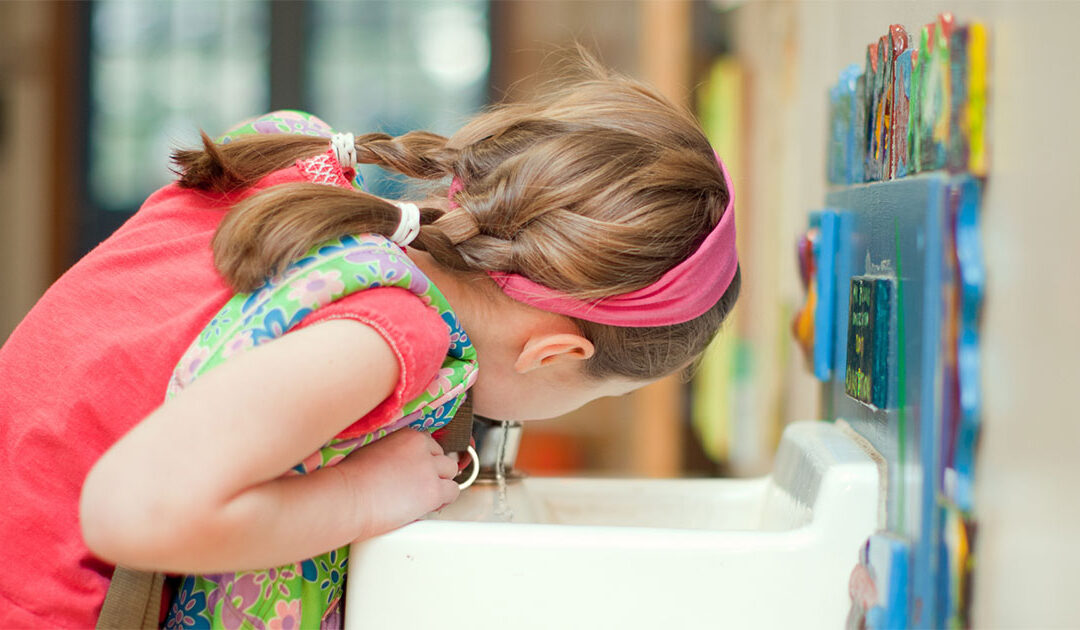Many people in the U.S. don’t think much about water quality — they turn on the tap and assume their water is safe to use. But the Flint water crisis brought the issue into the national spotlight. Most consumers are now more aware of the dangers of lead in drinking water, especially for children.
There is no known safe level of lead exposure for kids. Even lower levels can potentially cause issues that range from behavioral problems, learning disabilities, and impaired growth, to coma, convulsions, and even death. The best way to make sure every child in every school has access to clean, safe water is through testing and creating and following a Water Management Plan developed specifically for each school building.
The good news for eligible schools and childcare facilities? The whole process, including assessment, testing, and developing a plan, is free for many Michigan schools and childcare centers. The State of Michigan, through the department of Environment, Great Lakes and Energy (EGLE), determines a school’s or childcare center’s eligibility for water system assessment and testing. The State has also allocated funds to resolve any issues that turn up, from building flushing to installing filters to replacing fixtures.
Michigan Takes Action
Despite what happened in Flint, most elevated lead levels in drinking water have little to do with the water supply from the local municipality. Rather, they are due to water sitting in lead pipes, faucets, and plumbing fixtures in older buildings. For example, when schools shut down during the pandemic, there was no daily flow of water through the pipes. Water within the pipes remained stagnant for many months, which could potentially affect building water quality.
The State of Michigan is committed to keeping drinking water safe for children, so EGLE created the School Drinking Water Program. EGLE provides water safety guidance and tools for all school and childcare facilities, including plumbing assessments, water management plans, sampling plans, sample collection, interpretation of results, risk reduction actions, and training programs for school personnel.
EGLE also provides Michigan communities with guidance and administers federal funding from the Environmental Protection Agency’s WIIN Grant — created through the Water Infrastructure Improvements for the Nation (WIIN) Act. The grant awards funding to small, underserved, and disadvantaged communities to assist public water systems in meeting Safe Drinking Water Act requirements.
Michigan’s Senate passed a bill to address access to clean drinking water in schools. That bill is now in House committee. It is hoped the bill will soon undergo reconciliation then be passed and signed by the Governor sometime later this year. The final bill will require Michigan schools and childcare centers to develop and carry out a drinking water management plan, install filters on every consumption tap, and test the water for lead every year.
Helping To Keep Water Safe
The TriMedia team is helping to make sure that Michigan schools have access to safe, clean water by conducting free plumbing assessments for eligible school and childcare buildings before they undergo lead testing. TriMedia also develops individualized Water Management Plans (WMPs) for each building. WMPs help building operation staff keep water safe through regular flushing programs. There are approximately 4,000 public and private schools and about 4,400 licensed preschools and child development centers in Michigan. We have performed plumbing assessments and developed WMPs for more than 750 school and childcare center buildings since 2018. Our contract with the State of Michigan has been extended through 2024 to help ensure that every eligible school can be tested.
The plumbing assessments and WMP data collection have minimal impact on schools. The time at each building ranges from about an hour for a smaller school or childcare center up to a full day for larger school buildings. The onsite schoolwork can be scheduled when classes are not in session. Data collected for plumbing assessments and Water Management Plans includes:
- Examining all plumbing fixtures to determine if they’re consumptive (such as drinking fountains) or non-consumptive (such as restroom or janitor sinks)
- Mapping water sources and developing unique fixture identification codes
- Creating a list of fixtures and a sequence for sampling, starting with fixtures closest to the water meter
When the assessment is finished, the list of consumptive water fixtures and a corresponding map are submitted to EGLE; EGLE coordinates with the Department of Health and Human Services (DHHS), which contacts the school and schedules the water sampling. Results come back in about six weeks after the initial plumbing assessment. Depending upon the sample results, EGLE works directly with individual schools to address any elevated lead levels . Solutions may include executing a flushing plan, installing filters, restricting water sources to hand washing only, or replacing fixtures. The State of Michigan has allocated funds for various options, including replacement.
How to Get Your Water Tested
Schools and parents that are interested in learning more and getting their water tested can start by visiting the EGLE website. EGLE’s School Drinking Water Coordinator Holly Gohlke can tell you if your school or childcare facility is eligible to participate in the program, and can help qualifying schools and facilities schedule a free water testing plan. She can be reached at 517-220-1904.

